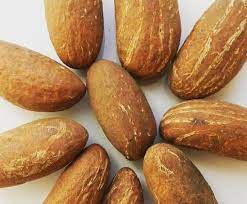Bitter Kola, also known as bitter cola or Garcinia Kola, is a plant native to Central and Western Africa with a long history of therapeutic use. The seeds are the most commonly ingested portion of the Bitter Kola plant, while all parts are utilized in traditional African medicine.

Bitter kola seeds have a harsh, bitter flavor that gradually fades into a faint sweetness as you chew them, and they’re usually consumed raw.
Different tribes have different names for Bitter Kola in Nigeria; “Orogbo” in Yoruba, “Miji-goro” in Hausa and “Akiilu” in Igbo. This detailed articles aims at explaining the uses, nutritional properties and health benefits of bitter kola.
This traditional plant is considered an excellent source of essential vitamins and minerals, including Vitamins [A, C, E, B1, B2, B3], fiber, calcium, potassium, iron, etc. One thing about Bitter Kola is that it is versatile such that its fruit, seeds, nuts, and even bark serve a lot of medical and traditional benefits.
The following are the 10 health benefits of Bitter Kola:
1. Malaria treatment.
Bitter kola is thought to have antimalarial effects due to its chemical characteristics. Kolaviron, a natural antioxidant and anti-inflammatory phytochemical with strong antimalarial effects are present.
2. Weight reduction.
Bitter kola is a natural hunger suppressant as well as a powerful thirst stimulant, which aids in weight reduction because the body requires a lower intake of food and a significant intake of water to get rid of extra fat and stay healthy.
3. Diabetic complications.
Bitter kola seeds are thought to have the ability to reduce blood glucose, making them a viable treatment for diabetes Miletus.
4. Protection against glaucoma.
A group of researchers discovered that using an eye drop produced from a garcinia kola extract regularly can help treat glaucoma.
5. Remedy for a cold or a fever.
By expanding the alveolar sac and duct, bitter kola soothes chest colds and helps to prevent them completely.
6. Erectile dysfunction treatment
Garcinia kola (bitter kola) has been demonstrated to have aphrodisiac properties (causes or increases sexual desire) in men and is therefore used to treat erectile dysfunction.
7. Immunity.
Bitter kola affects various physiological systems, including the immune system. It aids in stress adaptation while also serving as an anti-infective.
8. Osteoarthritis.
According to studies, garcinia kola has significant analgesic and anti-inflammatory benefits in patients with knee osteoarthritis.
As a result, garcinia kola is regarded to be an effective osteoarthritis disease activity moderator. It helps to relieve inflammation, pain, and stiffness in the joints.
A joint injury, weight, aging, or inherited factors can all contribute to arthritis and painful symptoms. As a result, consuming this miraculous plant can help to resolve and cure all of these problems at their root.
Read Also: Yara Launches World’s First Green Autonomous Container Ship
9. Healthy lungs.
Saponin, an antioxidant, is found in Garcinia kola. It has cleansing and purifying properties. As a result, the lungs’ function is improved by widening the alveolar ducts and sacs, which strengthens the fiber in the lungs’ tissue. It has a lot of antioxidants, which are good for keeping your body in good shape.
10. It is beneficial to a pregnant woman.
Bitter kola, contrary to popular belief, has been stated to be beneficial for pregnant women, as it aids in the relief of nausea and vomiting, improves the health of the uterus, provides strength to the expectant mother, and also normalizes blood circulation.
Meanwhile, a medical study examined the nutritional value, properties, and phytochemical content of Bitter Kola. Bitter kola was found to contain a lot of carbohydrates, ash, crude fiber, crude protein, and fat. The study on the nutritional and medicinal values of Bitter Kola showed high levels of vitamin C, calcium, iron, and potassium.
The phytochemical assessment showed that bitter kola contained tannin, sapoium, phytic acid phenol, Trypsin inhibitor, sterol, flavonoid (2.130%), Alkaloid, oxalate, caffeine, and hydrogen cyanide.
Kindly like us on Facebook















Discussion about this post